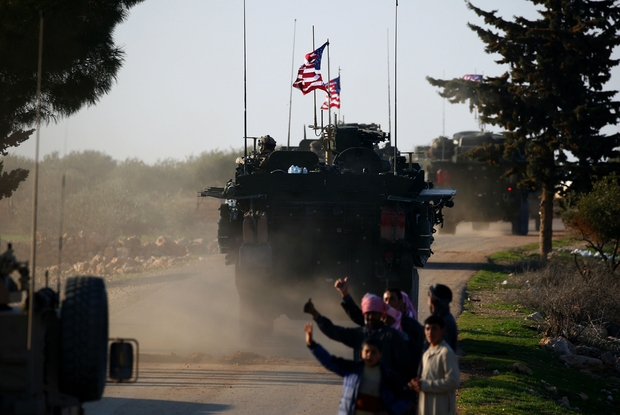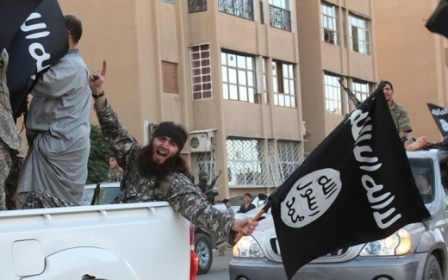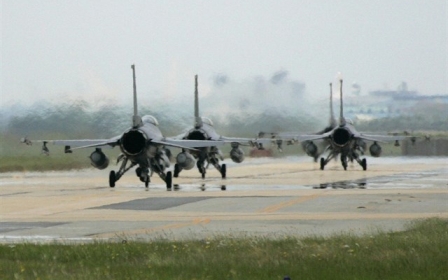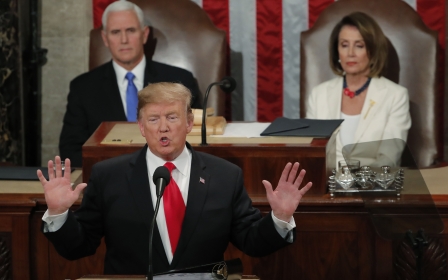US calls on allies to send troops to Syria as it continues its withdrawal

Senior United States lawmakers and military officials have urged the country's allies to send hundreds of troops into Syria, as the US plans its withdrawal from the war-torn country, a top US official said.
Speaking on a panel at the Munich Security Conference on Friday, US Senator Lindsey Graham said the US would consider keeping some troops in Syria if Washington's allies agreed to deploy their own forces to help create a buffer zone near the Turkish border with Syria.
Graham said he discussed the plan ahead of the conference with US General Joseph Votel and President Donald Trump, who announced in December that the US planned to pull about 2,000 American troops out of Syria.
Votel, who is the top general leading US efforts to fight the Islamic State (IS) group, has been vocal in his opposition to the withdrawal of US forces.
New MEE newsletter: Jerusalem Dispatch
Sign up to get the latest insights and analysis on Israel-Palestine, alongside Turkey Unpacked and other MEE newsletters
"The post-caliphate strategy should be different than the fight to destroy the caliphate," said Graham, before calling on international officials in the room to send their own troops.
"I'm hoping that President Trump will be coming to some of you and asking for your help and you will say yes. And in return, the capability that we have that is unique to the United States will still be in the fight in Syria," he said.
Graham also said the US would try to gain support for this plan at the conference.
Acting US Defence Secretary Patrick Shanahan did not secure any solid pledges of support, however, as he met with 13 defence ministers from countries that make up the anti-IS coalition on the sidelines of the conference, AFP reported.
Shanahan said the US would "maintain our counterterrorism capabilities in the region" and "continue to support our local partners' ability to stand up to the remnants of ISIS", using another acronym for the militant group.
He gave no further details about how this would be done, AFP said.
Allies express criticism
IS militants have been boxed into a small area as the group battles over its remaining patch of territory in northeastern Syria.
In the aftermath of Trump's decision to pull out US troops - which stunned Washington's allies in Europe - questions have swirled around the timeframe for the withdrawal, as well as what will happen in Syria once US troops leave the country.
On Friday, Belgian Foreign Minister Didier Reynders said the US had told coalition partners its soldiers would leave in "weeks rather than months".
'It is totally out of the question to have French troops on the ground without the Americans there. It's just no'
- French government source
Still, the US decision remains contentious for many of the country's allies, including France, which contributes artillery and about 1,200 troops in the region, including soldiers who train Iraqi troops.
"It is totally out of the question to have French troops on the ground without the Americans there," one French government source told AFP on Friday.
"It's just 'no'."
In a panel at the Munich conference, French Foreign Minister Jean-Yves Le Drian asked why the US would create a vacuum in Syria that may benefit Iran, calling the approach a "mystery", AFP reported.
German Defence Minister Ursula von der Leyen, whose country has helped with surveillance flights and logistical support, also expressed criticism at the idea that European forces would stay in Syria after the US withdrawal.
Von der Leyen said the idea of the anti-IS mission should be "in together, out together", AFP said.
A senior US defence official, meanwhile, told the news agency that none of Washington's allies had made any "specific commitment ... either whether they would stay or [whether] they would leave when we have left".
There was "a tremendous desire to have a security arrangement or mechanism", the official said, but conceded that no concrete solution had been found to "resolve the security vacuum".
Middle East Eye delivers independent and unrivalled coverage and analysis of the Middle East, North Africa and beyond. To learn more about republishing this content and the associated fees, please fill out this form. More about MEE can be found here.




